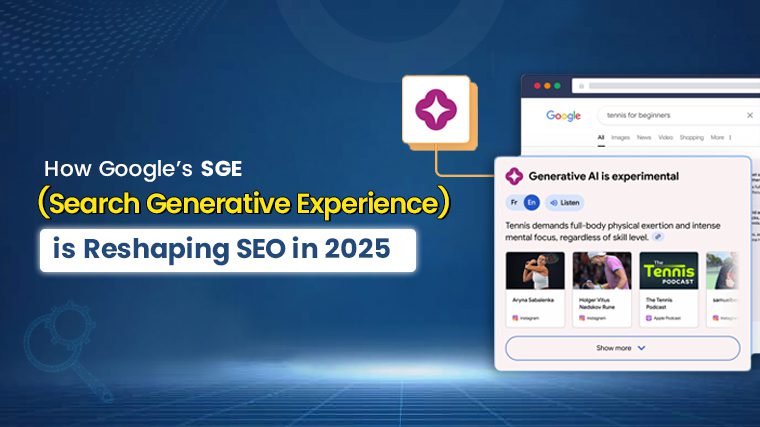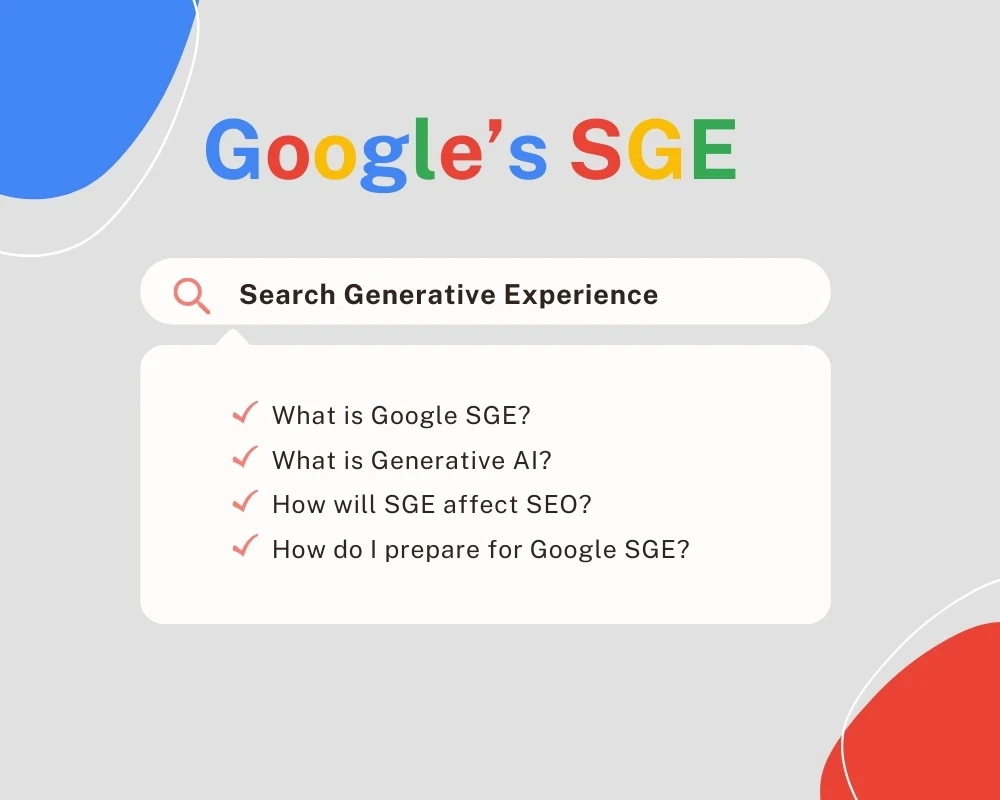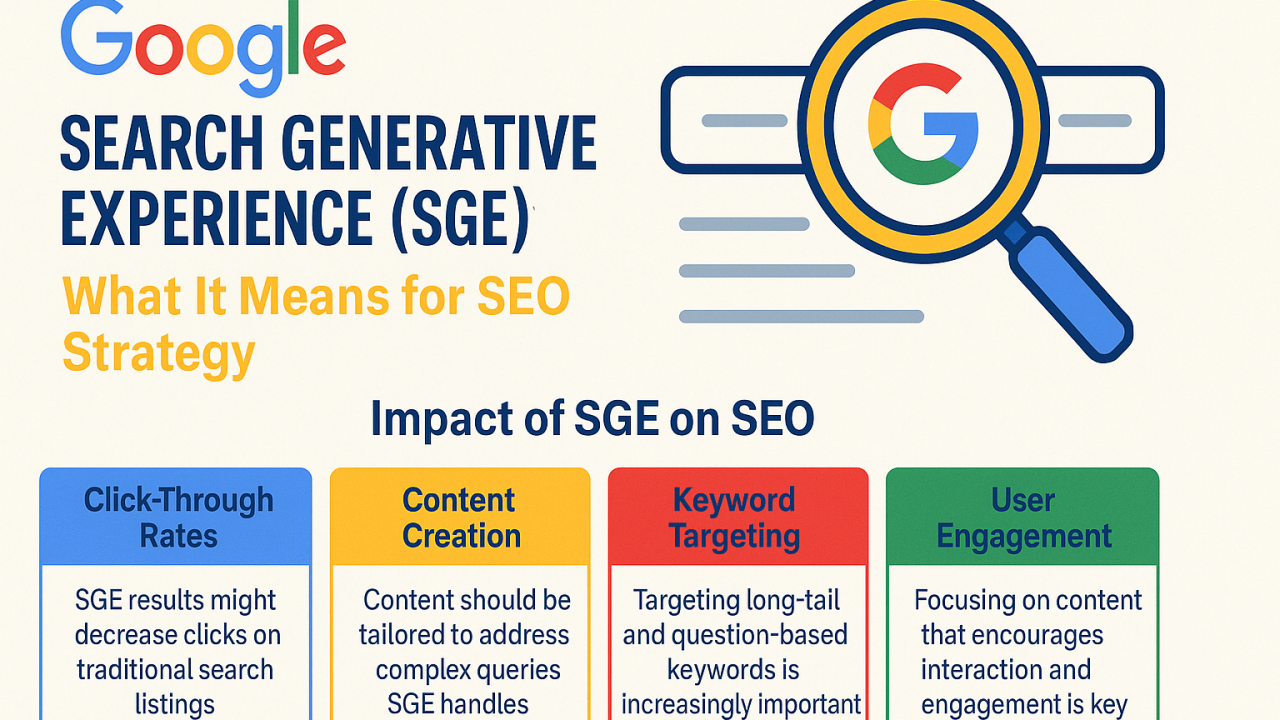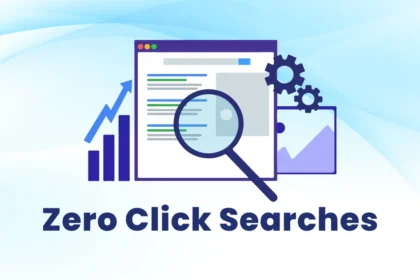As Google evolves from a search engine to an AI-powered answer engine, one of its most transformative developments is the Search Generative Experience (SGE). Powered by large language models, SGE offers conversational, synthesized responses directly in search results—often above traditional organic listings. For users, this means faster, more natural access to information. But for marketers and SEOs, it raises a big question: how does SGE affect SEO strategies moving forward?
In this article, we break down what SGE is, how it changes search behavior, and what businesses must do to stay visible in this AI-first search landscape.
What Is Google’s Search Generative Experience (SGE)?

SGE is Google’s AI-driven search interface that provides AI-generated answers at the top of the search results page. It draws from multiple sources to deliver a unified, conversational summary that often includes links to cited websites, follow-up questions, and multimedia content.
Key features of SGE include:
- AI Overviews: Summarized responses to queries, especially complex or multi-part questions.
- Conversational follow-ups: Users can continue asking related questions in a more natural, chat-like format.
- Multimodal search: Integration of images, videos, and interactive content into AI-generated results.
- Citation links: Highlighted sources used by the AI to generate its summaries (though not always prominently).
SGE fundamentally shifts how users engage with information—and how websites earn clicks.
How SGE Is Reshaping SEO

1. Fewer Clicks to Websites
SGE introduces a zero-click search experience on a much larger scale. Users often get their answers directly in the AI-generated summary, which reduces the need to visit the actual source websites.
Impact:
Even if your content is used as a reference by the AI, users may never click through to your site. This means lower organic traffic—especially for informational, how-to, and definition-based queries.
2. Visibility Becomes AI-Driven
Ranking #1 is no longer the only goal. With SGE, your content may be included (or excluded) from the AI summary regardless of its position on the traditional SERP.
Impact:
You need to optimize for AI visibility, not just ranking. That means ensuring your content is clear, structured, and semantically rich so it can be effectively parsed and quoted by generative models.
3. E-E-A-T Matters More Than Ever
Google emphasizes Experience, Expertise, Authoritativeness, and Trustworthiness (E-E-A-T) as core factors in how content is evaluated—especially in sensitive areas like health, finance, and news. SGE leans heavily on these signals when deciding what content to summarize.
Impact:
Anonymous, low-quality, or unverified content will be filtered out. High-quality, author-backed content with clear sourcing and credibility has a better chance of being included in AI summaries.
4. Content Format and Structure Are Critical
SGE favors clean, scannable, and structured content—the kind that LLMs can easily digest and repurpose into answers.
What works:
- FAQ formats
- Clear subheadings (H2/H3)
- Bullet points and numbered lists
- Concise definitions and summaries
Impact:
Websites that focus on readability, formatting, and structure will be more likely to be cited in AI Overviews.
5. Follow-Up Queries Change Keyword Targeting
With SGE, users can continue the conversation by asking related questions. This leads to a shift in keyword behavior—from broad searches to more natural, long-tail, and follow-up-style queries.
Impact:
SEOs must optimize for question-based and conversational queries, anticipating the paths users might take through a topic.
Opportunities Hidden in the Shift
While SGE may reduce traffic for some sites, it also opens new doors:
1. Brand Visibility in AI Overviews
Even without a click, being cited in an AI Overview reinforces your brand’s authority. This is especially valuable for new or emerging brands looking to build recognition.
2. Content Repurposing and Semantic Coverage
SGE rewards topic depth. Sites with robust content ecosystems—covering a subject from multiple angles—are more likely to be referenced by AI.
3. Own the Conversation
By anticipating follow-up questions, you can create content that captures multiple stages of the search journey. This positions your site as the go-to authority across an entire topic cluster.
How to Optimize for SGE: Actionable Tips

✅ Focus on Topical Authority
Build deep content around your core topics. Use internal linking and semantic clusters to signal expertise.
✅ Use Schema Markup
Structured data helps Google understand the context of your content, which can improve your chances of being cited in AI summaries.
✅ Prioritize Author Transparency
Include author bios, credentials, and contact information to build trust—especially for YMYL (Your Money or Your Life) content.
✅ Write for Humans and Machines
Use natural language, but structure it clearly. Define key terms, answer common questions, and avoid vague or fluffy writing.
✅ Monitor AI Mentions and Zero-Click Behavior
Use tools and analytics to track if your content is being referenced by AI—even if it doesn’t result in a click. Adjust content accordingly.
What About Ads and Affiliate Sites?
SGE poses challenges for:
- Affiliate marketers, who rely on comparison-style content that may now be summarized by AI.
- Ad-driven publishers, who will likely see fewer clicks and lower impressions from content that gets answered in the AI box.
The path forward for these models is to:
- Add unique value that AI can’t replicate (e.g., hands-on reviews, proprietary insights).
- Embrace first-party data and direct engagement strategies (email, social, community).
The Future of SEO in the SGE Era
SEO is no longer just about getting clicks—it’s about being present where decisions happen, whether or not a user lands on your page. In this new reality:
- Visibility > clicks
- Trust > traffic
- Answers > articles
SEOs must evolve their mindset from chasing rankings to earning relevance in an AI-powered discovery environment.
Final Thoughts
Google’s Search Generative Experience is changing the SEO game—less about links, more about answers. While it brings uncertainty for traffic-dependent sites, it also rewards those who create high-quality, authoritative, and helpful content.
To succeed in the age of SGE:
- Focus on trust
- Structure your content clearly
- Anticipate conversational queries
- Stay agile and monitor AI behavior
SGE isn’t the end of SEO—it’s the next evolution. The brands that adapt now will shape the future of search.






